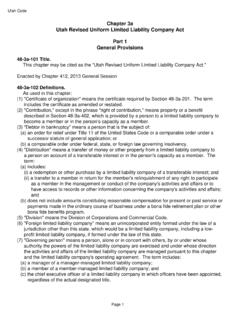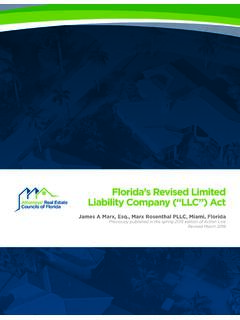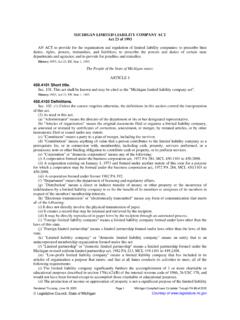Transcription of Conversion and Domestication under the New Jersey Revised ...
1 NEWJERSEYLAWYER| October you represent a limited partnership (call itOldCo LP) that, for any number of reasons, wantsto become a limited liability company (LLC). Thiscould be accomplished in any number of ways. Forexample, a new LLC could be formed (call itNewCo LLC) and all of the assets of OldCo LPcould be transferred to NewCo LLC in exchange for member-ship interests in NewCo LLC. Thereafter, OldCo LP would beliquidated and dissolved, distributing NewCo LLC s member-ship interests to OldCo LP s partners, and changing the nameof NewCo LLC to OldCo LLC. Alternatively, NewCo LLC couldbe formed and OldCo LP merged into NewCo LLC. Thereafter,the name of NewCo LLC could be changed to OldCo of these methodologies essentially effect the desiredgoal of having OldCo LP s business carried on by an , each approach involves multiple steps and, in theend, OldCo LLC is not the same entity as OldCo LP.
2 For exam-ple, its date of formation as indicated on the public recordswill be jurisdictions have developed a streamlined proce-dure whereby an entity, by virtue of a simple filing, can electto change its form of organization (for example, changingfrom a corporation to a limited liability company ). Such aprocedure allows a business to select an entity form thatmeets its current Jersey s Revised uniform limited liability CompanyAct1(NJRULLCA), which (since March 1, 2014) applies to allNew Jersey LLCs, authorizes such a streamlined, one-stepmethod by which an organization other than a domestic LLCor a foreign LLC may convert to a domestic LLC, and by whicha domestic LLC can convert to a domestic or foreign organiza-tion other than an LLC.
3 These entity changes are called con-versions under NJRULLCA. As opposed to the two methodolo-gies described above for changing a limited partnership to anLLC, to effect a Conversion under NJRULLCA only one piece ofpaper need be filed. Furthermore, at any one time there existsonly one business entity and the converted entity is the sameone that existed prior to the Conversion . Finally, as will be fur-ther explained below, since there has been no merger no dueon merger clauses will be triggered, and since there has beenno sale of assets no due on sale clauses will be also provides a streamlined process by which anLLC can change the state of its organization. Somewhat confus-ingly, the authors believe, NJRULLCA uses the term domestica-tion to refer to both a foreign LLC becoming a domestic LLCand a domestic LLC becoming a foreign LLC.
4 As with conver-sions, domestications are effected with the filing of only onepiece of order for a New Jersey LLC to convert or domesticate toanother organization (defined under NJRULLCA as a generalpartnership, including a limited liability partnership, limitedpartnership including a limited liability partnership, LLC,business trust, corporation, or another entity having a gov-erning statute, whether or not organized for profit), the result-ing organization s governing statute has to authorize the con-version or Domestication . At this time, the governing statutesof no New Jersey entities (other than LLCs) authorize suchentities Conversion or Domestication as contemplated byNJRULLCA. On the other hand, Delaware law authorizes theconversion or Domestication of corporations, partnerships, limited partnerships and LLCs.
5 Thus, a New Jersey LLC canconvert to a Delaware corporation, for example, but not aNew Jersey has been introduced to amend the New JerseyBusiness Corporation Act to permit the Conversion and domes-tication of New Jersey and when this pendinglegislation is passed, New Jersey LLCs (and LLCs formed in anyother state that has adopted the Revised uniform limited Lia-bility company Act or whose law otherwise permits conver-sions) will be able to convert to New Jersey corporations. Fur-thermore, New Jersey corporations will be able to convert toNew Jersey LLCs, or LLCs or corporations formed in Delawareor any other state whose laws (for the applicable entity) permitsuch Conversion . The authors believe the pending legislation iswell drafted and will work as intended, but its terminology isnot entirely consistent with NJRULLCA.
6 Unlike NJRULLCA, itdoes not distinguish between conversions and way of example, under the pending legislation a New Jerseycorporation changing to a Delaware corporation would becalled a Conversion and not a and Domestication under the New Jersey Revised uniform limited liability company Actby Ira B Marcus, Sean Aylward and Denise WalshProcess of Converting orDomesticatingUnder NJRULLCA, the process forconverting or domesticating an LLC isessentially the same. Both must beeffected pursuant to a written plan ofconversion or Domestication , as the casemay be. The written plan must include:a. The name and form of the organiza-tion before Conversion or domestica-tion;b. The name and form of the organiza-tion after Conversion or domestica-tion;c. The terms and conditions of the con-version or Domestication , includingthe manner and basis for convertinginterests in the converting or domes-ticating organization into any combi-nation of money, interests in theconverted or domesticated organiza-tion, and other consideration; andd.
7 The organizational documents of theconverted or domesticated a plan is prepared, it must beapproved by the members of the con-verting or domesticating LLC. Thedefault rule is that all of the members ofa converting or domesticating LLC mustapprove the plan of Conversion to :2C-11, the operating agreement mayvary this default rule and permit a statedplurality ( , 50 percent, or two-thirds)to approve a consolidation or domestica-tion, subject to one caveat. Specifically,per 42:2C-86, if a member of aconverting or domesticating LLC willhave personal liability with respect to aconverted or domesticated organization,that member must consent to the con-version or Domestication unless thecompany s operating agreement pro-vides for approval of a Conversion ordomestication with the consent of lessthan all of the members and the memberhas consented to that provision of theoperating agreement.
8 Notably, a memberis not deemed to have given such con-sent merely by giving his or her consentto a provision in the operating agree-ment permitting an amendment of theoperating agreement without the con-sent of all of the members of the a plan of Conversion or a planof Domestication is approved, the con-verting LLC or domesticating organiza-tion must deliver articles of conversionor Domestication , as the case may be, tothe New Jersey Department of Treasuryfor filing. Requirements for these arti-cles are set forth in 42:2C-80and 42:2C-84, an LLC has adopted and approved aplan of Domestication providing for thecompany to be domesticated in a foreignjurisdiction, a statement surrenderingthe company s certificate of formationmust be delivered to the New JerseyDepartment of Treasury for must give the name of thecompany and recite that the certificateof formation is being surrendered inconnection with the Domestication ofthe company in a foreign set forth that the domesticationwas approved as required by NJRULLCA,and set forth the jurisdiction of forma-tion of the domesticated foreign is important to note that the restric-tions on approval of conversions anddomestications (and mergers, too) setforth in 42.
9 2C-86 only apply if amember of a converting or domesticatingLLC will have personal liability withrespect to a converted or domesticatedorganization. In many instances, howev-er, a member of a converting or domesti-cating LLC may have his or her rightsdiminished by virtue of the conversionor Domestication . For example, the rightof a member following Conversion ordomestication to examine the company sbooks and records, or to possess dis-senter s rights with respect to mergers orconsolidations, may be diminished. Byway of further example, a member of anLLC may have enhanced exposure if theentity is converted to a limited partner-ship because there will be potential liabil-ity if the member (as a limited partner ofthe converted entity) becomes activelyinvolved in the control of the negotiating an operating agree-ment on behalf of a member, practition-ers should keep these issues in of Conversion orDomesticationAlthough the process of convertingor domesticating an entity may be sim-plified under NJRULLCA, a businessorganization should not convert ordomesticate without first considering allof the implications of the Conversion or Domestication ,the resulting entity is, for all practicalpurposes, the same entity that existedbefore, albeit in a different organiza-tional form.
10 Notwithstanding this fact,conversions and domestications do notoccur in a vacuum. Entities have assetsand business activities that may be sig-nificantly affected by a Conversion to converting ordomesticating, an entity should consultwith its tax advisors and legal counsel toassess in advance the tax consequencesand practical business issues that arisefrom Conversion or Domestication . Thisarticle addresses some of the businessconcerns arising from a Conversion or adomestication, as well as the tax conse-quences that must be considered priorto converting or DissolutionA Conversion or Domestication doesnot interrupt the continuous existence ofthe converting or domesticating provides that except as oth-erwise agreed the Conversion or domes-tication does not dissolve a converting ordomesticating permittedby the express terms of the statute, itseems unlikely that business ownerswould dissolve an entity in response to aconversion or a | October and PropertiesAll assets and property owned by theconverting or domesticating entityremain vested in the converted ordomesticated thoughno change in ownership occurs.







